12/9
A few more photos from Varanasi I meant to include in the previous post:
The communal bathroom, including 'shower' area, at our $7.50 a night Shivakashi Guesthouse! We had to fill the bucket with hot water in the hallway and then use a large measuring cup as our 'shower.' Rudimentary yes but the water was lovely and hot unlike so many other places we stayed at this trip.
While waiting for our tuk tuk taxi to pick us up to take to the airport in the street outside the maze of alleys where our guesthouse was, we watched the bike rider stop right in front of us and nonchalantly wander over to the side of the street and relieve himself - a common sight as I mentioned in Varanasi but one that still nonplussed me.
The early morning fog en route to the Varanasi airport did not augur well for the timely departure of our flight to Agra. True enough, our flight was delayed a number of hours but at least Steven was able to find an outlet at the airport for me to plug in the laptop so I could spend the time typing up notes for blog posts so the time was put to good use.
Construction of the awe inspiring building on the banks of the Yamuna River started in 1631 and took about 22 years to complete the entire premises and required an estimated 20,000 workers.
Lapis lazuli, cornelian, malachite, coral, mother-of-pearl, agate and emeralds were inlaid in floral and geometrical patterns in the marble itself.
A view of one of the mosques from inside the mausoleum.
After spending almost 2 hours wandering around the huge complex, we rested at the hotel for a bit and I washed out some unmentionables and hung them out on the balcony to dry even though the hotel manager cautioned me the monkeys might take them. I guess the monkeys didn't find my things appealing as everything was safe and sound when we returned later!
A massive one and a half mile long and 69 foot high wall surrounded the fort which was protected by a moat and another wall - quite the daunting barrier to anyone who hoped to access the treasures within, I'm sure you'd agree!
Tomb of John Russell Colvin, the Lieutenant Governor of the North West Provinces of India, who died at the fort in 1857.
More photos of the stunning Khas Mahal:
The Anguri Bagh or Grape Arbor showed the outlines of a geometric garden built around delicate water channels and chutes.
The Mina Masjid or Small Mosque was built entirely of white marble between 1631 and 1640 by Emperor Shah Jahan for his personal use.
This huge tank, built in 1610, was used for bathing. It measures 5 feet high, 8 feet in diameter and 25 feet in circumference.
Photos of Jama Masjid:
The reddish light came from the ‘curtain’ covering the entrance to the door.
We hired a tuk tuk driver on the street in front of the hotel asking him only to take us to one specific store that was mentioned in a guide and was located by the Taj Mahal’s East Gate. The shop had lots of beautiful inlaid marble items, scarves, textiles, paintings on silk fabrics, the works. Shopping inAgra was a
very different experience than any place else; there did not appear to be any
‘market’ area for tourists or souvenir stores all grouped together near the
major sights. Instead, there were large stores scattered around the city that
sold a little bit of everything as the one did by the East Gate. Tuk tuk
drivers who ‘lured’ or directed their passengers to these shops would all get a
small percentage of anything that was bought there. This practice was not new
to us but knowing the only way we would get to these shops was with a driver
made the process harder to accept. We
felt we were at the mercy of the driver(s) and no longer in charge of which
shops we’d go to as we were of course ignorant as to what was available to buy
in their city.
The entrance gate to Itmad-Ud-Daula's Tomb.
We were surprised that we were among the very few tourists at the gorgeous Baby Taj considering the throngs of tourists that earlier had been at both the Taj itself and Agra Fort.
I loved the still stellar shades of blue glazed tiles.
Mehtab Bagh is a huge garden complex located on the left bank of the Yamuna River in straight alignment opposite the Taj Mahal.
We did manage to see the sunset at Metheb Grab and, though it wasn’t the most spectacular one we’d ever seen because of the haze and clouds, it was worth seeing contrary to what the first tuk tuk driver had told us.
A few more photos from Varanasi I meant to include in the previous post:
The communal bathroom, including 'shower' area, at our $7.50 a night Shivakashi Guesthouse! We had to fill the bucket with hot water in the hallway and then use a large measuring cup as our 'shower.' Rudimentary yes but the water was lovely and hot unlike so many other places we stayed at this trip.
While waiting for our tuk tuk taxi to pick us up to take to the airport in the street outside the maze of alleys where our guesthouse was, we watched the bike rider stop right in front of us and nonchalantly wander over to the side of the street and relieve himself - a common sight as I mentioned in Varanasi but one that still nonplussed me.
The early morning fog en route to the Varanasi airport did not augur well for the timely departure of our flight to Agra. True enough, our flight was delayed a number of hours but at least Steven was able to find an outlet at the airport for me to plug in the laptop so I could spend the time typing up notes for blog posts so the time was put to good use.
On arrival at the airport in Agra, we had LOTS of time to enjoy watching the parrots as there were no taxis awaiting deplaning passengers - a first for us as well as 3 other couples who were in the same boat. Luckily we were able, after an hour's plus wait, to share a taxi with one of the other couples, Diana and Mohan, who were staying at a hotel near ours.
It was difficult to find our Ray of Maya Hotel in Agra which was located down the alley way above and had no signage either from the street or at the entrance itself; we certainly wondered what we had gotten ourselves into this time!
Above, the unmarked entrance to the hotel. Luckily though the room was lovely, we had our own shower (a real one too!) and even a balcony. One peculiar thing we discovered was that none of the 5 hotels we stayed at in India had any heat controls in the rooms. We were able to borrow a small heater though in each case, albeit generally after long delays, which was sufficient.
12/10
Our hotel was located just 5 minutes from the Western Gate
entrance to Taj Mahal; in fact it was the closest hotel so we had really
lucked out once again in terms of location. The hotel had suggested we arrive there no later than 6:30 to get the dawn’s pink reflection but
that was a tad early for His Nibs but 7:30
was doable luckily!
We were surprised though that there were absolutely no signs indicating one of the wonders of the world was through the gate above.
I had read that we could take nothing in but passports and money, i.e. no bags, backpacks, bottles of water, snacks, etc. That must have been old information though because we saw plenty of people who brought all those items in through security.
Photos en route to the Taj Mahal itself:
From the entrance gate it was about a 20 minute walk to the admission office; some chose to get there by the lumbering camels.
In case you don’t know the story behind the Taj Mahal, it is a mausoleum that was built in the seventeenth century by the grief stricken Emperor Shah Jahan
as a sublime love song in memory of his favorite wife whom he adored. How romantic is that!
Crossing the large courtyard we saw the monumental gateway
of red sandstone inlaid with white marble. The entrance way was emblazoned with
inlaid inscriptions from the Koran.
Photos of Taj Mahal:
Leaving the archway, the Taj seemed unreal in its all-encompassing
whiteness. It stood at the end of a large garden that was divided into 4
sections by pools of water. Midway between the entrance and the Taj was a large
pool, called the Lotus Pool, because of its lotus shaped water spouts.
The garden in front of the Taj is said to represent paradise
because Islamic texts of the period described Paradise
as a garden of 4 rivers separating it into 4 quadrants. The canal lined with
cypresses, which used to alternate with orange trees, guided our eyes toward
the magnificent Taj.
Construction of the awe inspiring building on the banks of the Yamuna River started in 1631 and took about 22 years to complete the entire premises and required an estimated 20,000 workers.
Two beautiful and mammoth sandstone mosques were on opposite sides of the mausoleum.
One of four slender, marble minarets at each corner of the Taj platform. They blended so well into the general composition that it was hard to believe that each one was over 130 feet high. The minarets were built at a slight tilt away from the mausoleum so that, in case of an earthquake, they would fall away from the building.
Photos from inside the mausoleum where Emperor Shah Jahan was laid to rest beside his beloved wife:
Lapis lazuli, cornelian, malachite, coral, mother-of-pearl, agate and emeralds were inlaid in floral and geometrical patterns in the marble itself.
The Taj Mahal's most extraordinary feature was the onion shaped dome. The central, 81 foot high inner dome above was placed inside an outer shell to attain the extraordinary exterior height of 200 feet. Between the two is an area nearly the size of the interior hall itself.
A view of one of the mosques from inside the mausoleum.
Photos from the back of the Taj:
A couple from the Cherry Creek area of Denver
asked us to take their photos for their Christmas card from this spot as we were leaving the Taj Mahal. They
then took ours - sorry that we didn't send out any Christmas cards of our own this year. Coming home on December 18th after a three and a half month long trip around the world, I just couldn't find the time to send out cards as well as decorating the house and doing everything else to get ready for Christmas.
The hotel had arranged the
previous evening for a tuk tuk driver to pick us up at 10 to see some of the
sights around Agra for up to 8 hours. In front of the hotel manager, we
talked with the driver about what we wanted to see as well as the types of
souvenir shops we wanted to stop at. Everything seemed fine and so we set off.
We had wanted to see the Cathedral first but the driver said he couldn’t take
us there so drove us instead to nearby St. Mary’s Church, a
pleasant enough church that was built in 1920.
Photos of St. Mary's Church:
As we entered the church, there was some recorded music
being played which was special.
The driver took us to Agra Fort next which was just a
short hop away. He said he would wait for us while we toured it and then walked
to, and toured, the Jama Masjid, i.e. the Friday Mosque, that he said
was only a few minutes’ walk away from the Fort.
Photos of Agra
We approached the fort from
the Amar Singh Gate, also
known as the Lahore Gate, for the city in modern day Pakistan that it faces. It sure felt like about 20 men asked us to
be their tour guide of the UNESCO World Heritage listed site but we declined
all offers though preferring to see it by ourselves.
The great Mughul Emperor
Akbar commissioned the construction of the fort in 1565 on the site of
an earlier fort; additions were made til the time of his grandson Shah Jahan. A
succession of Mughul emperors live at the fort and it was from there that the
country was governed. The largest state treasury and mint were contained in the
fort. The word 'fort' is misleading though as the complex is really a fortified
palace, containing royal apartments, mosques, assembly halls as well as a
dungeon - the entire cityscape of an imperial capital.
A massive one and a half mile long and 69 foot high wall surrounded the fort which was protected by a moat and another wall - quite the daunting barrier to anyone who hoped to access the treasures within, I'm sure you'd agree!
Tomb of John Russell Colvin, the Lieutenant Governor of the North West Provinces of India, who died at the fort in 1857.
The Khas Mahal or Private
Palace was built with white marble in 1637 and followed the classic
Mughul pattern with 3 arches on each side, 5 in front and 2 turrets rising out
of the roof.
More photos of the stunning Khas Mahal:
The Private Palace is famous for its paintings on marble. We could sure see why.
The Anguri Bagh or Grape Arbor showed the outlines of a geometric garden built around delicate water channels and chutes.
The Mina Masjid or Small Mosque was built entirely of white marble between 1631 and 1640 by Emperor Shah Jahan for his personal use.
Photos of the Taj Mahal from the back of Agra Fort;
unfortunately it was a hazy day so the photos didn’t come out well.
This huge tank, built in 1610, was used for bathing. It measures 5 feet high, 8 feet in diameter and 25 feet in circumference.
As we left Agra Fort, Steven and I were nonplussed that there were absolutely no
souvenir stands at either the Taj Mahal or at the Fort, both major
attractions in Agra .
We had thought it would only be a few minutes’ walk to Jama
Masjid but we didn’t know where it was exactly and there was little in the
way of signs so it took us a while to reach it. We did enjoy wandering through
the Muslim market area on the way though.
Photos of Jama Masjid:
Once again, there was no inner area of the mosque that we
saw unlike those mosques in Turkey
and Jordan we
toured last year. Instead Jama Masjid or Friday Mosque was characterized by the rectangular open courtyard.
We were the only foreigners there and created quite a stir
as we walked around the huge courtyard. I was ‘mobbed’ by very friendly people
wanting to take individual and then group ‘selfies’ of me with them – they kept
saying, 1 more photo, 1 more photo!
It was amazing to think they
appeared to derive so much enjoyment at having a photo of me with them. I think
they were touched and heartened that we had made an effort and expressed an interest in coming to their place of worship. It was obviously a rewarding and
profoundly touching experience visiting the mosque; I felt like a ‘goodwill
ambassador.’
The reddish light came from the ‘curtain’ covering the entrance to the door.
Children on their way to school all saying hello, hello as we walked back through the Muslim Market to Agra Fort to meet up again with our tuk tuk driver.
We met the driver back at the Fort at 1 and asked him where
the shops were and he explained we had already walked through the Muslim Market
and that was the shopping he had planned for us – all news to us. Then he said
that the other sights we had planned on seeing were not ‘worth seeing’ and that
the hotel manager did not know anything about the city and where the tuk tuk
could go, etc. We told him to take us back to the hotel right away which he did
and left without asking for any money. What a frustrating time as again it
seemed that the driver had a plan as to what he wanted and where he wanted to
go even though it was all spelled out in advance.We hired a tuk tuk driver on the street in front of the hotel asking him only to take us to one specific store that was mentioned in a guide and was located by the Taj Mahal’s East Gate. The shop had lots of beautiful inlaid marble items, scarves, textiles, paintings on silk fabrics, the works. Shopping in
Long story short, the second tuk tuk driver proved to be
delightful and quite knowledgeable about all the shops in the city. We had to
be careful expressing any interest in jewelry, textiles, carpets, marble, etc as he knew of course the exact shop to take us to for each item! There was a fine line we
walked between wanting to shop without feeling he was taking us where the
prices might be higher or the selection of items less than we wanted.
The fellow, Raju, was so nice though we asked him to take us to the
tourist sights we had planned on seeing with the other driver. We knew that
with him we would go where we wanted – what a novel idea! The first place we
went to after the shop was Itmad-Ud-Daula’s Tomb which was also known as
Baby Taj.
Photos of Itmad-Ud-Daula's Tomb:The entrance gate to Itmad-Ud-Daula's Tomb.
Planting of mango trees in the open area between the gate and the mausoleum.
The exquisite marble tomb was built by Emperor Jahan's Queen in memory of her father from 1622-1628. The mausoleum on the bank of the Yamuna River had a strong Persian influence and was built entirely of white marble and inlaid with semi-precious stones. As a precursor to Taj Mahal, it is popularly referred to as Baby Taj.
As we drove to our next
site, Chini Ka Rauza, our driver, Raju, mentioned that the Taj Mahal used to
be free on Fridays; then the authorities closed it permanently on Fridays
ostensibly for maintenance but he inferred that was not in fact being done.
Babu told us he was 57 and had been driving a tuk tuk in Agra since moving there in 1981.
Photos of Chini Ka Rauza:
Chini Ka Rauza is the mausoleum of Shah Jahn's Prime Minister, a Persian poet, and was built in 1635.
How beautiful it must have been a long time ago; now though
most of the paintings were covered.
I loved the still stellar shades of blue glazed tiles.
We left Chini Ka Roza at 4:30 hoping to see the sunset at Methab Bagh before
it was too late. We were thrilled to meet up again with Diana and Mohan
when we got there. As I mentioned at the top of this post, we met them when we had arrived at the Agra
airport the day before and 8 of us were all waiting for taxis for about an hour
after we arrived.
They were kind enough to share
their taxi with us as our hotel was not far from theirs even though it meant Diana
had to almost sit on my duffle bag in the back of the taxi! They live in the
San Francisco Bay Area with Diana working as a nurse and Mo with a nonprofit
specializing in microfinance. As I’ve written before, Steven and I would be so
happy if they ever make their way out to Denver and want to stay with us.
Mehtab Bagh is a huge garden complex located on the left bank of the Yamuna River in straight alignment opposite the Taj Mahal.
Raju stopped at a few shops he thought we might be
interested in on the way back from Mehtab Bagh but he expressed no overt
disappointment when we didn’t buy anything and finally said we just wanted to be dropped
off at the Domino’s Restaurant so we could grab a pizza. It had been a long
day, and stressful one too, in part because of the hassles with the first driver, so we
needed some comfort food from home! Before Raju dropped us off though, we made
arrangements with him to pick us up at 8:30
the next morning to take us to Fatepuhr Sikri and then on to the bus
station so we could get the afternoon bus to Jaipur.
Posted on 1/1/16 from our home in Littleton, Colorado. Steven and I hope that the New Year will be a happy and healthy one for each of you reading this post and that you too are able to discover more of our beautiful and amazing world in the year ahead.






















































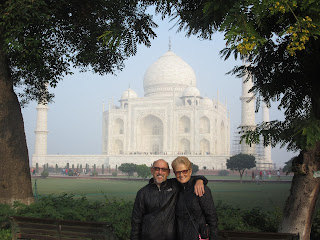
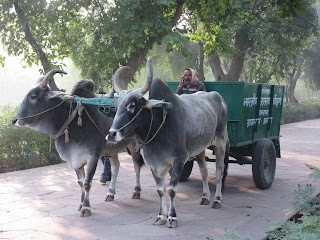







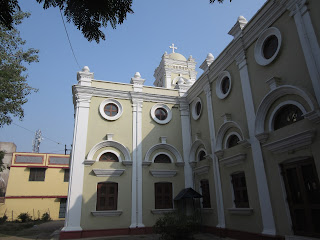



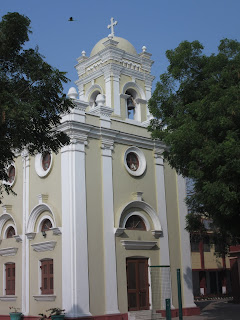











































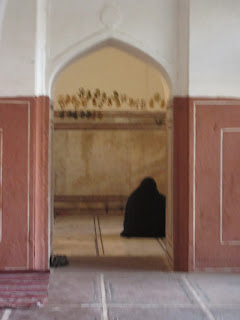


























































No comments:
Post a Comment
We love to hear your comments!